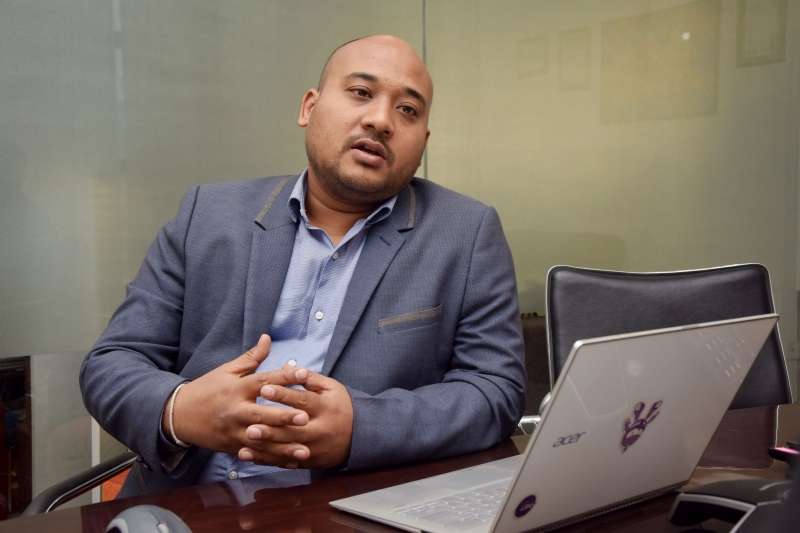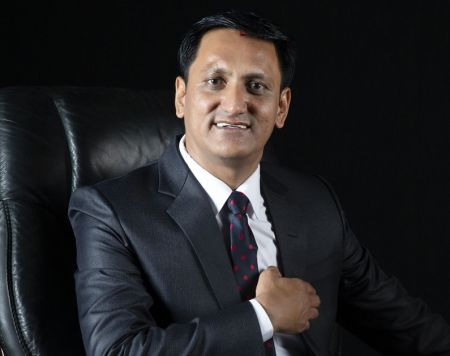Nischal Man Pradhan is the founder and CEO of Braindigit IT solution Pvt Ltd. Pradhan, who founded Braindigit with an initial investment of almost Rs 400,000 in 2008, has over 100 staff working at the company. In a short period, his dedication and hard work helped the company grow rapidly. There is a lot to learn from his successful and exciting career. Ashim Neupane of New Business Age sat down with Pradhan to discover how his career evolved over the years and his advice for young IT professionals hoping to make a mark in the world.
Passion > Education
Pradhan is not an IT student, but he was always interested in technology and software. Pradhan was a management student, and his family was in business. Pradhan, an average student his during school days, remembers how he was fascinated by information technology back then. Though he had little knowledge about IT, he was passionate to learn and explore new technologies. After he passed his School Leaving Certificate (SLC) exams, he joined Rato Bangala School for his high school education, but after discovering there were no computer classes at the school, he switched to Xavier Academy. While pursuing his Bachelor’s degree, he did crash courses in programming, designing, animation, which helped him to explore the IT sector.
Fight your Fears
While pursuing a Bachelor’s degree from Nepal College of Management (NCM), there was an open underground space just opposite his college. He and his friends used to have lunch there. “My friends and I rented that place to start our own venture. But the space was not properly used. While doing my Master’s degree, I talked with my parents and they supported me a lot to establish my own venture,” he shares. With the support of his family, he started an IT company called Braindigit in 2008. He established the company with an initial investment of almost Rs 500,000. “If I was afraid of starting the company, I wouldn’t have reached this stage,” he shares.
Patience is Key
Before establishing the company, he worked as a freelancer and had pursued different tech projects. “I had brought a game project, which was Braindigit’s first project. For a year and a half, we worked as an outsourcing company as we had no resource to develop our own products,” he remembers. Then, he met Alok Pandey, formed a team, and worked hard to achieve their goals. “We are now a product-focused company. Now, we have few outsourced contracts. We work to make our products accessible to all. We develop our products in such a way that people who are not technologically savvy can use it,” he shares.
Embrace Challenges
At the time of establishing the company, he had little knowledge about the IT sector. In the initial stages, investment was a major challenge for shaping the company. For three years he faced many challenges, so the company worked as an outsourcing company. However, with the dedication and hard work from the team, the company secured major projects. “There were many challenges throughout my career. There were many trials while establishing and developing the company. But, I was confident, and I never had a feeling that the field is not for me,” he shared.
“We have already developed the software for the Department of Foreign Employment. Recently, we also developed the Central Board Box Office for the Film Board, which will help to solve the problems in the movie industry. We were around 10 people in the initial stages. And now, we are a team of over 100 people,” he shares, adding that the company is still facing challenges. “Nepali market is small, so we have been focused on entering the international arena,” he shares, adding that entering the international market is a hard task, but the company has a presence in the Australian and a few other markets.
Family is Fundamental
He shares that his father has always supported him in his business. His father is involved in the publishing business. “My dad owns Neema Pustak Prakashan. My father and I are working together to develop digital learning in Nepal. We will include all the contents in the school level to develop a platform ‘Neema Academy’. The product is still in the development process, and we have already talked to several schools about the product,” he shares. He hopes the product will come out in the market before the start of the new academic session next year.In the early days, he was helping out his father’s business. When Braindigit was established, he could not give time to his father, so he had to run the business alone. His father supported Pradhan to work harder to achieve his dreams.
Learn from Tech Titans
The careers of Steve Jobs, Mark Zuckerberg, and Jack Ma have inspired him a lot. “I have read about them and how they have faced difficult situations in their journey to become successful through hard work and dedication. All entrepreneurs and professionals may not face similar situations like those gentlemen, but we can learn a lot from their career,” he shares. He also feels that reading about their journey develops a ‘Never give up’ attitude in every professional. He wants to tell the youth that success does not come overnight; everybody should learn from his or her mistakes to grow better and stronger.
Don’t Give Up
Pradhan started Braindigit with a minimal investment. The initial stage was tough for him, but he never gave up. “In Nepal, the youth are establishing startup companies without an innovative idea. They establish a company with big dreams, but they don’t have the patience to wait for the results,” he shares and advises young starters to be patient and wait for results.
“Mark Zuckerberg developed Facebook in 2004 with a new and creative idea, but he waited for a long time to achieve what he dreamed of. Likewise, Alibaba and Amazon also had to work tremendously hard to establish themselves as the top e-commerce sites of the world,” he says. He adds, “Young people should learn to overcome the challenges and understand success is hard to achieve without failures. I suggest the youth to work in their specialised field and don’t try too many things at once.”






















